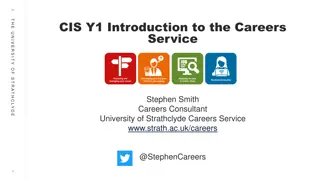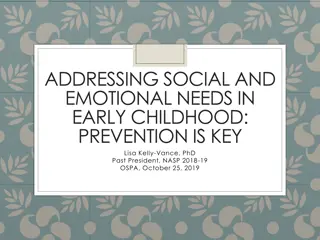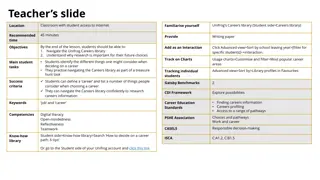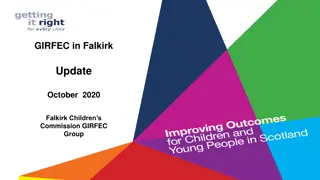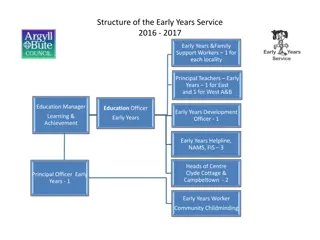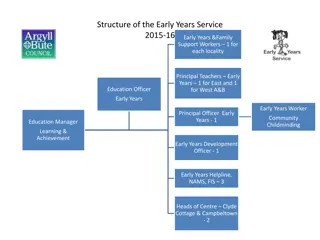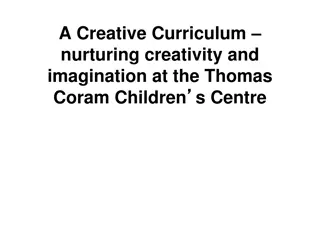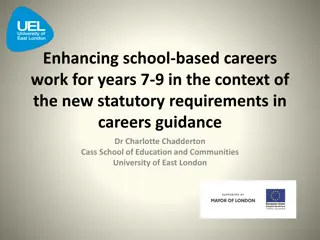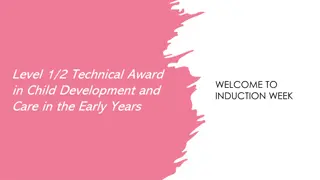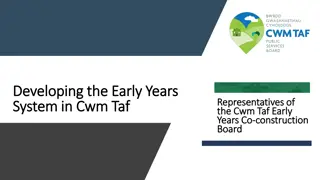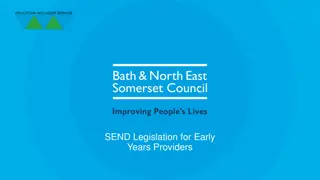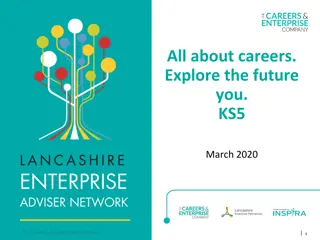Explore Careers in Early Years: A Rewarding Path for Working with Young Children
Discover the world of early years, focusing on children aged 0-5. Working in this field is about educating, caring for babies and young children, and supporting their developmental milestones. Early years jobs are crucial for society, offering rewarding, versatile, and fun work with a range of skills applicable in various fields. Consider a career in early years for a challenging yet fulfilling journey.
Download Presentation

Please find below an Image/Link to download the presentation.
The content on the website is provided AS IS for your information and personal use only. It may not be sold, licensed, or shared on other websites without obtaining consent from the author. Download presentation by click this link. If you encounter any issues during the download, it is possible that the publisher has removed the file from their server.
E N D
Presentation Transcript
Early years Early years needs needs you! you! The benefits of a career in the early years
What What are the are the early early years? years? The early years refers to children aged 0-5. Working in the early years involves educating and caring for babies and children between 0-5. Work in the early years could be as a childminder working in the home, an educator working in a private daycare or nursery, in a preschool, in a school nursery or reception class. A lot of early years providers also run out of school or holiday provision and often need staff for this work too.
Why are early years Why are early years jobs important? jobs important? There are many jobs available in early years settings. Childcare is vital for our society as it allows people with young children to work. Work in early years is incredibly rewarding, versatile and fun and gives those that work in it a range of skills and experience which would be applicable across many other fields.
Have you Have you considered considered a career a career working working with young with young children? children? People can work in early years at many different qualification levels There is lots of support and options available to gain qualifications, including whilst working There are lots of ongoing professional development opportunities and courses available for early years practitioners Some early years settings and out of school clubs will take on volunteers, apprentices or unqualified staff in addition to qualified staff There will be expectations to attend short courses at regular intervals
Varied it changes every day. Flexible some jobs are part time, term time only or offer flexible working hours. Others are full time. There may well be a working pattern that would suit your needs. Childminders work in the home and can look after their own children at the same time. Rewarding - doing something worthwhile and making a difference to children. You are experiencing and facilitating children s developmental milestones. Opportunities to problem solve the unpredictable brings challenges and working towards solving them brings a sense of achievement. Teamwork and support a strong sense of teamwork, even solo childminders tend to link up for support. The The benefits of benefits of working in working in the early the early years years - - it it really isn t really isn t like other like other jobs! jobs!
The benefits of working in the early years The benefits of working in the early years Working outdoors most roles involve supporting learning and development through playful experiences, spending lots of time outdoors as well as inside as early learning occurs everywhere. Few roles are desk based. Being part of the community and helping families early years settings are at the heart of the community. Working with young children and their families means you are really making a difference to people s lives. Self development - early years jobs involve learning about child development and behaviour and experiencing this first hand. There are plentiful opportunities for continuing professional development and meeting people. Being creative, playful and having fun If you like to play, be imaginative and creative, get messy, be outdoors, make things, have varied opportunities, interesting conversations and make lasting relationships then come and work in the early years!
Play is a vital part of working in the early years and is one of the many ways children learn. Supporting this learning requires in depth understanding and skill. Play is essential for both children and adults as it allows creativity, free expression, opportunities to experiment and problem solve. Isn t it Isn t it just just play? play? Play is the answer to how Play is the answer to how anything new comes about anything new comes about Jean Piaget Adults join in with play when working with early years children.
Who Who can can work in work in the the early early years? years? Whether you are leaving school or college or fancy a career change later in life, the early years sector welcomes a diverse workforce of all ages. It is important for children, particularly in the early years when their brains are developing incredibly rapidly, to experience and build relationships with people who represent their community and the wider society.
Inclusion and equality are driving principles in the early years sector Who Who can can work in work in the the early early years? years? The early years sector is keen to recruit more men Calls for more men to work in the early years Early years staff must have a sufficient standard of spoken and written English to ensure the wellbeing of children in their care All people working in the early years will need to apply for an enhanced DBS check
Want to work from home Want to work from home and fit around caring for and fit around caring for your own family? your own family? You do not need a qualification to become a childminder though you need a pre- registration short course to understand the Early Years Foundation Stage (EYFS), paediatric 1staid training and safeguarding training. How to become a registered childminder in Suffolk | Community Directory
Start up grant Start up grant for new for new childminders! childminders! For childminders registering from 15/03/2023 a start up grant of 600 is available For childminders registering with an agency a grant of 1,200 Apply for a childminder start-up grant - GOV.UK (www.gov.uk)
Childminders can look after their own children whilst caring for other children There is a need for childminders in many areas of Suffolk Most childminders operate mainly from their home though can operate for 50% of the time out of their home Childminders can also employ up to 2 assistants or work alongside another registered childminder More More about about childminding childminding
How do I get an early years qualification? How do I get an early years qualification? Choosing a training provider there are a range of training providers both locally and nationally with different learning options, such as classroom or distance learning and with a range of costs. There are a range of easily accessible early years qualifications at all levels Level 2 & Level 3 qualifications are most popular and take 1 - 2 years to complete. You can also train to degree level and beyond in Early Years. The government currently provide free level 3 qualifications dependent upon eligibility. Government guidance on free, Level 3 qualifications
Gaining a qualification whilst working in the Gaining a qualification whilst working in the early years early years Qualification routes You can study in a college full time with work placements in early years provision. The Level 3 qualifications such as T levels & diplomas take 2 years to complete and local colleges in Suffolk offer these courses. You can do an apprenticeship whilst earning a wage working in an early years provision. These take between 18 months and 2 years to complete. Contact your local college, training provider or Apprenticeships Suffolk for information
Gaining a qualification whilst working in the Gaining a qualification whilst working in the early years early years Unqualified jobs - Many early years settings and out of school clubs take on volunteers, apprentices or unqualified staff. However, most staff must be qualified to provide the legal ratios of trained adults to children. This means qualified positions are the most common roles advertised. Beware! Early Years qualifications must be considered full and relevant by the DfE to count in legal ratios. Training and Qualifications Suffolk Learning Check early years qualifications GOV.UK (www.gov.uk)
Already have a degree? Already have a degree? You can undertake Early Years Initial Teacher Training (EYITT). This usually takes a year and can be done whilst working in an early years setting. Funding is available. Some who choose early years as a career also go on to take a masters in an associated field. Early years initial teacher training (ITT) providers - GOV.UK (www.gov.uk) Early years initial teacher training: 2023 to 2024 funding guidance - GOV.UK (www.gov.uk)
With qualifications and experience, there are staff management roles such as room leaders, deputy managers, nursery managers and in larger companies there are roles such as area manager With training, there are roles for Special Educational Needs and Disability Co-ordinators (SENCo) Some providers also have administrative assistants or business managers Most providers spend a lot of time outdoors, for example operating forest school sessions and there may be opportunities to attend training around this to become a forest school leader Other Other roles in roles in early early years years settings settings
Delivering early years training as a tutor, assessor or lecturer Early Early years years career career pathway pathway possible possible further further jobs jobs With experience and transferable skills gained in early years provision, there are other job pathways which may be available. Working for the local authority, for example, in the early years and childcare service, in early help or inclusion Training as a school teacher Further qualifications may be required. Working for health, for example in a children s centre or training as a speech and language therapist Working in social care, for example training as a social worker
Have young Have young children? children? Access funded childcare You may be able to access 15 or 30 hours per week of childcare for 38 weeks of the year. That s 570 or 1,140 hours per year. The funded hours are for children aged 2, 3 and 4 whose families meet the eligibility criteria. Currently, all 3 & 4 year olds are entitled to at least 570 hours per year, starting the term after their 3rd birthday. The funded offer of 570 hours for working parents is increasing to include children aged 2 from April and 9 month olds from September 2024. Working parents can access 1,140 hours for children from 9 months from September 2025. Many childcare settings allow children to attend where their parent works if there is space. Group settings can claim funding for the eligible children of their staff. NB childminders and childminders assistants cannot claim funding for their own child or for another close relative. Childcare choices Guidance for parents and carers | Suffolk County Council
Eligibility Eligibility criteria for criteria for working working families to families to access access funded funded childcare childcare To qualify you must earn a minimum of the equivalent of 16 hours a week at the minimum wage and 100,00 a year or less. This applies to both parents in a couple as well as to single parents. Use the Gov.uk website to apply www.gov.uk/apply-30-hours-free-childcare If you're approved, you'll receive a code to give to your childcare provider. For more information, visit Childcare Choices How to apply for 30 hours free childcare | Childcare choices
Early Years & Childcare Service For more information on working in the early years please visit our website working in the early years sector


